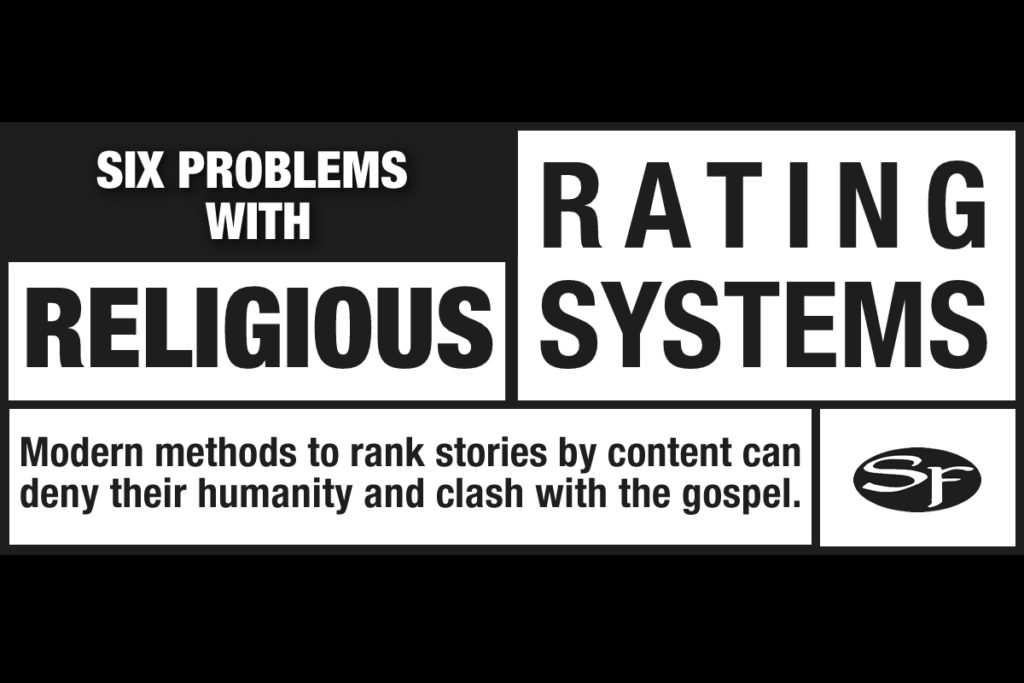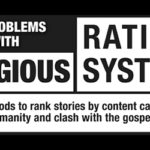Three More Problems With Religious Rating Systems
Continued from Three Problems with Religious Rating Systems.
Religious rating systems try to break stories into pieces that can be ranked according to content, such as worldview, language, or righteous/sinful moments.
But unfortunately, RRSs do not “rhyme” with the gospel in which the “rating system” of God’s law leads us to grace, not vice-versa. Second, RRSs are built with the assumption that our ultimate purpose is to do “spiritual” things, rather than seeing the “spiritual” actions as means to become like Jesus. And thirdly, RSSs do not respect the humanity of stories.
Those are my first three problems with religious rating systems. Here are three more:
4. Scripture books and passages don’t pass RRSs.
If we came up with a modern rating system meant to sort and classify only the “content” of a story, what would happen if we applied this system to the Bible?
The Bible itself would not pass such a system.
I hear this rebuttal so often that I wonder if RRS advocates have grown weary of the repetition. So let me try saying it this way: As Christians, we know the Bible is all one great story. But it comes in several different “parts,” that is, books, stories, genres and subplots. People also see the Bible is “fragments” thanks to our chapter-and-verse divisions of the book. (Chapters and verses were not in the original Old or New Testaments of Scripture.)
Now, imagine if someone—as some atheists actually do!—approached the Bible with an RRS. Imagine someone reading, say, Judges 19, or Song of Solomon. Imagine someone reading a single chapter from Jesus’s “sermon on the mount” without seeing it alongside His entire ministry, and the vital gospel “commentary” from Paul and other apostles. What happens?
You could easily “rate” the Bible’s “content” very poorly. You could insist it is not religious at all. You could call Judges 19 nihilistic, Song of Solomon hedonistic, and Jesus legalistic.
If the Bible itself could not pass an RRS, why insist on these systems for other stories?
5. RRSs can transmit traditions as biblical standards.
A religious rating system does not argue biblically for its own existence or our need for it. An RRS’s maker—whether it is a rating board somewhere or an individual—presupposes these reasons. Hidden underneath are many assumptions and traditions. These may or may not align with what the Bible actually teaches as truth applying to all Christians.
For example, an evangelical movie rating website might say, “This movie has 5 F-words and is inappropriate for persons of faith.” Well, the movie may be inappropriate for children.1 But often such RRS -based reviews imply that a story’s unsuitable for children is unsuitable for anyone. Such websites teach mature Christian adults to remain immature. The sites assume tradition of childhood “innocence” that is at best optional for Christians, and at worst, a denial of Scripture. Mature and holy Christians know what evil is. They must not participate in evil ourselves, but we are commanded to expose evil with light.2
In part 1, I referred to a newer suggestion of a content ranking system. Christian fantastical story fan David Bergsland suggests five tiers of spiritual content in stories. His approach is an improvement on simplistic cussword-counting or worldview-labeling. Bergsland also suggests a fifth and highest “tier” of spiritual content, “spirit-filled fiction”:
They are focused upon characters with (or who develop) an intimate relationship with the Lord. They talk with Him all the time, day in and day out, hour by hour, minute by minute. And He responds with emotional cleansing, answered prayer, and direct guidance throughout the daily life they lead. The characters may or may not be religious in church attendance. …
Arguably, the very thing Bergsland suggests is optional for this highest-tier Christian fiction is in fact non-optional for super-Christian characters: church participation! Meanwhile, the very thing he suggests is non-optional for a top-tier Christian character is, at best, an evangelical tradition—an expectation that Christians pray nearly nonstop and that God “prays” back with “direct guidance” for daily life decisions.3
My point is not to refute a particular evangelical view of the Christian life. My point is to show that this is a particular evangelical view, the same as “the best churches have pianos and organs,” or, to hit a little closer to my own tradition, “theology is best approached in huge books that systematize every biblical theme into complex topical chapters.”
I must say this: to enforce such rules as normative or spiritual for Christian-made stories would be one of the surest way to ruin them. Christian-made stories are certainly better when they are biblical. But we must take care not to equate “biblical” with “my tradition”!
RRSs can err by transmitting traditions as biblical standards expected of all Christians.
6. RRSs presume specific personality traits are standard for readers.
Finally, RRSs appeal to a personality type I am not certain how to classify. So I will call them classification-people. I also like to classify things. I like defined labels, systems, folders and subfolders, alphabetized bookshelves, and carefully delineated theology. This is a gift of God. He created our impulse to organize and put things in order, right there in Gen. 1:28.
 But we must be careful not to see our own classification-impulses as morally beneficial, or expected of all other Christians. I think classification-people make this jump when we enjoy a story and try to find a “praise language” (sort of like a “love language”) to express our enjoyment. For example, I might read Marc Schooley’s novel König’s Fire and, if asked why I liked it, I would first refer only to Content. “This novel really explored the problem of evil, and the oft-ignored biblical theme of creation’s groaning and vengeance against man.”
But we must be careful not to see our own classification-impulses as morally beneficial, or expected of all other Christians. I think classification-people make this jump when we enjoy a story and try to find a “praise language” (sort of like a “love language”) to express our enjoyment. For example, I might read Marc Schooley’s novel König’s Fire and, if asked why I liked it, I would first refer only to Content. “This novel really explored the problem of evil, and the oft-ignored biblical theme of creation’s groaning and vengeance against man.”
However, König’s Fire is so much more. Its heroes, paranormal creep, magical realism, and overall dark atmosphere together make the story. If I try to classify particular “contents” apart from that story, I’m imposing on the story itself, the author, and other readers. I’m suggesting my own personal “language” for praising the story ought to be the standard.
This is another reason RRSs fail. They insist on classifying “content,” as if the story is simply a box, a worthless shell, carrying more-valuable Content parts—like (as some Christians wrongly suppose) the human body is a worthless shell carrying the more-valuable soul.
I can understand this response to stories. I can understand this response being helpful to fans of similar personalities. But it is a personal response, not a biblically normative one.
Conclusion
Content-rating systems (such as the MPAA’s film ratings) have their place. They can help individuals start to determine if a story is fitting for their own God-glorifying enjoyments, or would tempt them to sins they struggle with. But content-rating systems are only a start. Christians must use them as only one part of their mission to engage stories together.
But I would do away entirely with religious rating systems, which confuse law with gospel, reverse the biblical order of our evangelizing and culture-making goals, disrespect the humanity of stories, raise a modern standard Scripture itself could not meet, transmit traditions as biblical standards, and presume specific personality traits (such as “classify ALL the things”) ought to be standard for discerning Christian readers.
Instead of building better rating-system machines, we ought to help grow better readers. All humans can reflect God’s creativity as well as love for beauty and truth, because all humans bear the image of God. How much more can all Christians, who all have the Holy Spirit, learn to focus not on a God of fragmented or isolated “content,” that must be dutifully classified, but on our personal, incarnate, walking-among-us God, Jesus Christ? He is the Creator of the world and re-creator of us, so we can create and enjoy stories for Him.
Our priority in stories is not dutiful classification, but joyful response in the gospel.
- One legitimate purpose of rating systems is to offer a method of allowing parents and leaders to determine a story’s suitability for children. I do not argue against content-rating systems altogether. I oppose an approach that views religious content-rating as the only way of discerning a story’s content for all Christians. ↩
- Ephesians 5: 11-13, Hebrews 5:12-13. ↩
- Scripture does not record the apostles receiving this kind of direct guidance for daily life decisions. Even if the Bible did say this, it does not teach or even imply that non-apostle believers can expect the same. The Bible is clear that all true Christians are Spirit-filled. See Romans 8: 9-11. The apostle Paul outlines a binary: either you are “in the flesh” or you are “in the Spirit … who dwells in you.” He leaves no category of Christians who are saved but not Spirit-filled. More discussion is outside this article’s scope. For more on this topic and to answer common proof texts, I recommend Greg Koukl’s series of articles, Does God Whisper? Part 1, Part 2, Part 3. ↩










































Look, I just want to make it very plain that while I can agree that “spiritual rating systems” are full of problems and inherently limited, I do not think it is wise to come out against them in absolute terms. If a rating system is useful to the RATER, even if I think it is imperfect, let the rater be free to use it as he or she wills.
I think this sort of thing falls perfectly in the realm of religious liberty outlined in Romans 14 and 15. Let each believer be fully persuaded in his or her own mind whether or not to use a religious rating system. If doing so, the limitations of the system should be made clear. If not, then the complete subjectivity factor or having no rating system should be seen as a potential hazard.
Note that I do not know of ANY rating system that does not have deficiencies. There are movies which are rated G which have ideas very strongly expressed that I would hesitate to expose children to. There are R rated movies which are filled with Christian themes. However, I think the movie rating system, while not perfect, does supply some useful information.
If someone can likewise supply useful information with a “spiritual rating system,” albeit imperfect information, I could imagine myself actually paying a bit of attention to such ratings, something I have not ever done up until now.
I agree with all of that, Travis. The only concept I critique here is the concept of establishing a personal rating system (with preferences and traditions) as a universal system for Christians.
“RRS passes on traditions as Biblical standards”
Steve, and Charismatic “Spirit filled” Christian will ne Er refer to their beliefs about the Holy Spirit as a “tradition” but as God’s promise, God’s Word, or Truth. Otherwise, they wouldn’t believe it. Likewise, a devout Catholic will never call their view of what it means to be “Pro life” as a tradition, but part of living out the Gospel, preventing murder, honoring God in their marriage, preventing injustice (in death penalty). YOU know. Non negotiable stuff. Convictions of faith, not traditions.
And every serious American Christian does this. It’s a quintessentially American interpretation of fealty, piety and freedom.
SO….you’ve got a problem with that reason.
Brother Burnett scores again — I think. 🙂 With two caveats. One is, we all have our traditions and your roots are showing with your footnote about “Does God Whisper?” I’m a graduate of both Oral Roberts University AND Westminster Theological Seminary [cue the tro lo lo song here) so I am very familiar with both extremes of “new revelation” and the third member of the Reformed Trinity, The Holy Scripture (which is equated with the Spirit for all practical purposes). Yes, we all have traditions and this is one of the dangers of the RSS. You have yours also, and it is good to see you admit it — few do. Second caveat is, let’s be very careful about how we treat others here. Bergsland has become quite the target the last two or so weeks. While we may or may not like what he advocates, let’s be careful. I hope this anti-RSS and Bergsland’s ratings does not degenerate into attacks — which is not your intent, nor your tone at all. In our striving to apply the Word, let’s not lose it. Thanks for keeping a clear head and, I feel, an honest heart.
Yeah, I’m going to read Bergsland’s book because I liked conversing with him on the comments boards and his thoughtful responses to my views. A man like that writes a book worth reading – which I plan to do. I encourage ANYONE with strong opinions on this subject to read his rating system book. Too much we talk about other people and what we think they think, and don’t examine their actual work.
Stephen, while I agree with your overall direction, I have a very small quibble with your point 5 when you said
From your post, I surmise that the presence of evil in a movie is permissible if it is part of exposing it. I have questions about this. Are we to expose the evil of cursing, for example, by having cursing in a book or movie? I mean, isn’t that something we can hear pretty much any time of day in any venue? It doesn’t need to be exposed, in the sense that it exists. It might need to be discussed in light of what Paul says about course speech, but a story doesn’t seem to be the proper venue.
On the other hand, in contradiction to exposing evil, 1 Cor. 14:20 says, “Brothers and sisters, do not be children in your thinking. Instead, be infants in evil, but in your thinking be mature.”
My opposition to rating sites is that they keep believers immature in our THINKING. Rating sites and systems give believers an alternative Big Brother to rely on, to believe in, to follow.
I have no problem with reviewers, as I may have said previously. They can stimulate our thinking. But when we set up any to be the “go-to guy” who we rely on as our bible for . . . oops! There’s the problem. We already have a Bible, and it is to God’s Word we must go, not to a social media pundit who has done our homework for us (using, perhaps questionable means).
Becky
Amen to all that, Becky.
I think people need to make more-careful arguments about things like questionable language. Blasphemy — the taking of God’s name in vain — is not limited to using His name as a swear, but that misuse of His name would count as an automatic sin. However, other “bad” words are more debatable, and fall under the category of shifting culture and language. (See also: pants on women.) People can use them as rebellion, or (most likely) in anger, or in shock, awe, or grief.
Regardless, I would say this: Christians ought to recognize they cannot confuse the hearing of a swear word, vulgarity, or a blasphemy, with the actual commission of that sin. This builds a “fence” around the actual word of God.
So I would also say that the inclusion of certain bad words in a story is not specifically necessary to expose, say, the darkness of swearing. I think it is necessary to show the world truthfully and thus expose the kinds of evil that make people want to swear — evils such as anger as well as our responses to consequences of evil. I think that if we make a rule like “no swearing in fiction, ever,” we are unable to see (or show) reflections of truth: this is how life really is, often nasty and suffering, so bad that we may be driven to swear. That’s a kind of exposing we ought not to obscure.
As far as I can tell, we agree 100 percent on this — and on the err of an evangelical approach to “outsourcing” our discernment to reviewers rather than pursuing our own discernment (giving our own weaknesses and needs!) per the Bible and the Spirit!